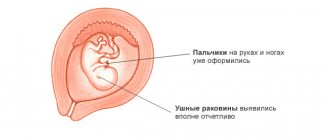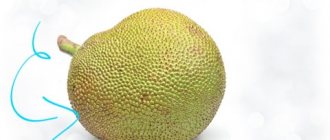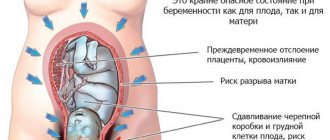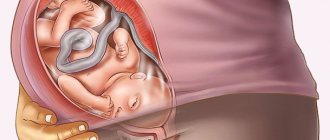The 39th week of pregnancy means that your baby is fully mature and ready to be born. Your pregnancy is approaching the final stage - childbirth.
On the one hand, there is a feeling of fatigue and a desire to quickly pick up the baby in your arms, on the other – anxiety. It’s not just the moment of childbirth that worries you, but the rest of your life.
For now, future parents have little idea of how life will change, what they will have to give up, what rules to introduce. In fact, this doesn’t matter anymore, because very soon a child will appear in your house.
Fetal development
Your child is fully viable, all his organs are mature and ready to perform their functions outside the mother’s body.
This is what your baby looks like at 37 weeks
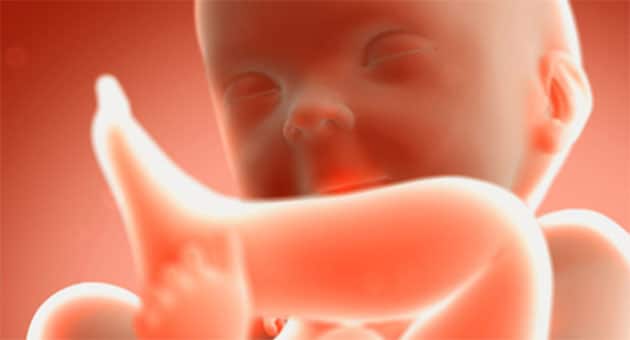
Now he looks exactly like the kids in the photos you've probably been adoring over the past few months.
His skin is pink, vellus hair can remain only in folds, on his forehead and on his shoulders. The nails extend beyond the edge of the fingers and are quite sharp.
The baby’s weight gain should have stopped by now - this is how nature intended it to make it easier for the mother to give birth.
The space in the mother’s stomach is becoming less and less, the baby is not moving very actively, as if gaining strength before giving birth. Mom will notice a decrease in the activity of the belly, there is no need to panic, but also lose sight of it. There should still be at least 10 large movements.
The brain is responsible for the baby’s actions and his perception of the environment. He actively reacts to what is happening around him, recognizes voices and music.
Itching during pregnancy
Body itching during pregnancy worries every fifth woman. It can be either barely noticeable or unbearable - it depends on the individual characteristics of the body.
What are the main factors causing this unpleasant condition?
Itchy skin during pregnancy is most often associated with dry skin. This is observed in connection with hormonal changes, but the cause may also be ordinary dehydration. At the same time, the skin looks thinner and smooth. You need to start treatment by drinking a sufficient amount of fluid - 1.5-2 liters per day every day. If it does not help, you should contact an endocrinologist.
Skin stretching
Itchy skin during pregnancy may be due to skin stretching. Not only the skin of the abdomen is stretched, but also the skin of the limbs and chest. It's all about increasing weight, growth of the uterus and swelling, which also greatly stretch the skin. You can help yourself by adjusting your diet and normalizing your drinking regime. Sometimes creams for stretch marks work well.
Body itching during pregnancy is often a consequence of increased sensitivity of the skin to irritants, such as sweat, laundry detergent, and synthetic clothing. Therefore, you need to fight such itching by frequent showers, using powders for sensitive skin and wearing clothes (especially underwear) made from natural fabrics.
Allergies can also cause itching during pregnancy. During pregnancy, all chronic diseases become aggravated, and allergies may appear, even if they did not exist before. You can check your guess using special antiallergic ointments or lotions that are allowed during pregnancy.
Ultrasound at 39 weeks of pregnancy
At 39 weeks of pregnancy, an ultrasound is not required. Only in certain cases can a doctor recommend undergoing an examination to determine the position of the fetus, the amount of amniotic fluid, assessing blood flow in the placenta, the length of the umbilical cord, the presence of nodes on it, and entanglement.
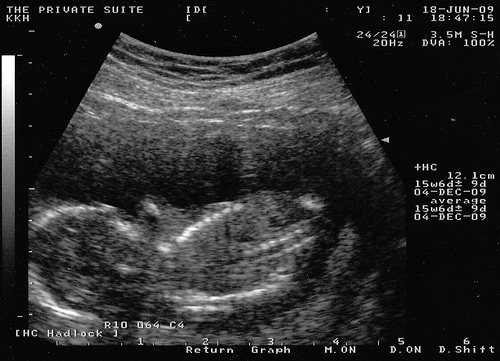
The condition of the uterus, cervix, its degree of maturity and readiness for childbirth will also be assessed.
When will labor begin?
There is an opinion that the second and subsequent births occur earlier than the expected date of birth. However, there are no facts or evidence for this statement. Yes, it happens that a child is born prematurely - at 37 or 38 weeks, but it is also not uncommon for a child to be born on time at 40 weeks. It is important to remember that no two pregnancies are the same, and each birth has its own scenario, different from the previous one.
Editor's choice: Pregnancy and sports - physical exercises for pregnant women
What happens in your body at 39 weeks?
The main changes that occur in the body at week 39 relate to the preparation of the genital organs for childbirth. The cervix softens and shortens. The tissue connecting the pelvic bones softens, and the excitability of the uterus increases. All this is necessary for the baby to pass through the birth canal as quickly but non-traumaticly as possible.
The abdomen descends, the presenting part of the fetus is pressed against the entrance to the pelvis. Pressure on the bladder and intestines leads to a number of inconveniences, but previously tormented heartburn and shortness of breath practically disappear, the woman’s general condition improves - she can breathe and eat more freely.
The expectant mother may notice a slight weight loss - the intestines are working more actively, and the bladder is emptied more often.
Carefully monitor how you feel - any pain in the abdomen, liquid discharge from the genital tract, or thick yellowish mucous streaked with blood may indicate the onset of labor. There is no need to be afraid - childbirth at this stage is normal.
How harmless is this phenomenon?
Several years ago, neither the women themselves nor their treating doctors attached much importance to this not very pleasant and very annoying phenomenon. This inattention was explained by the temporary inconvenience. Indeed, the itching, having tormented the pregnant woman a little, soon subsided without any preparative intervention. This was the case in the vast majority of cases.
The explanation for itching in the 2nd–3rd trimesters is logically associated with the growth of the fetus inside. The fetus develops, the uterus enlarges, causing the expectant mother’s belly to grow. And your stomach itches during pregnancy because your skin simply does not have time to adapt to such a rapid rate of overall growth. Have you noticed that itching is accompanied by exfoliation of the epidermis?
The elasticity and skin type of each woman are individual, so it cannot be said that everyone’s stomach itches without exception, and stretch marks threaten everyone. But still, everyone should have the necessary hygiene products to save or maintain moisture on the delicate skin of the abdomen.
How you feel at 39 weeks
The closer to childbirth, the greater the range of feelings the expectant mother may experience. She is afraid of childbirth, but is really looking forward to the moment when she can take the baby in her arms and put it to her breast.
It becomes easier to breathe, but other troubles appear, for example, it is difficult to remain in a sitting position for a long time - a drooping baby puts pressure on the pelvic organs.
At 39 weeks you will likely have a thick yellow discharge streaked with blood. This is how the mucus plug comes away, which served as a barrier throughout pregnancy and did not allow infection to reach the baby.
Changes in the gastrointestinal tract may include loose stools and loss of appetite.
Uterine contractions are becoming more frequent. The main thing is not to confuse them with true contractions. With true contractions, the intervals between them are reduced, and the duration of each increases over time. Amniotic fluid may break.
Whatever happens to you in the 39th week, do not forget to be attentive to your condition.
Why does your body itch during pregnancy?
Almost everyone has an itchy stomach during pregnancy, and developing stretch marks are not necessarily to blame. Irritation of the skin of the abdomen during pregnancy is common, although it is not the most pleasant sensation. It must be said that sometimes itching occurs even at a very early stage, which certainly has nothing to do with stretch marks - they appear when the tummy grows.
So why do these sensations arise?
In fact, the reasons are very numerous. Let's try to figure it out, and perhaps you will find one of these reasons in yourself, and you will be able to get rid of this unpleasant, annoying feeling.
Yes, yes, allergies. Tell me, have you ever had any allergic reactions? Many women only find out during pregnancy what kind of animal it is, and this is due to changes in the woman’s immune system. A growing baby is genetically only half a relative to the mother, and in order for the mother’s body not to reject him, a decrease in immunity occurs. The functioning of the immune system changes dramatically, and side effects may include allergies.
Have you ever been allergic to crab sticks? And in the first trimester you were desperately craving them, and you ate the whole package at once? The body can easily respond to this with an allergic reaction. Examine the skin on your stomach, if you see a rash, then most likely it is so.
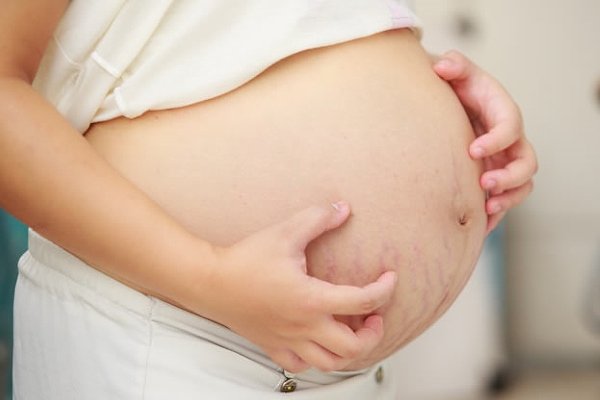
And this is how your body can react to many previously familiar foods. In this case, not only the stomach can itch, but also the chest, shoulders, neck, and even thighs, depending on your luck. You shouldn’t be afraid of such an allergy; after giving birth, your body will return to normal, and so will your immune system, and you will be able to eat these foods again, as before. In the meantime, remember that you ate too much before your stomach began to itch; during pregnancy you will have to give up this.
Increased sensitivity and dry skin
Sometimes a pregnant woman experiences itching in the abdominal area because the skin has become too sensitive. The skin of pregnant women reacts with irritation to synthetic fabrics, sweat, pollution, and friction from clothing. And the slightest violation of hygiene rules leads to irritation.
How to deal with this? Just follow the usual recommendations for pregnant women.
Avoid stuffy, hot rooms, wear clothes made from natural, breathable fabrics, and avoid things that are too tight for you. Shower daily and use skin moisturizers.
Intolerance to cosmetics
Do you buy an expensive imported cream for stretch marks, in the hope that it will prevent their appearance, but instead of relief, your tummy begins to itch, and your skin turns red? Try simple olive oil, all expectant mothers can definitely tolerate it, and it has no worse effect on the skin than the most expensive and advertised products.
Skin itching in pregnant women occurs in three cases: with allergies, with early and late toxicosis. A feeling of discomfort during toxicosis usually manifests itself when its course is severe.
You definitely need to tell your doctor about the problem, because if you have itching and severe toxicosis, this may be a symptom that your kidneys and liver are not coping. Then serious treatment is needed.
Itchy stretch marks on stomach
Almost everyone becomes acquainted from their own experience in the last weeks with such a symptom accompanying pregnancy as itching.
The rapid growth of the tummy leads to overstretching of the skin, when the strength reserve of collagen fibers is depleted - unbearable itching appears. At such moments, the windows in the dermis of the skin simply break, unable to withstand stretching. Of course, in relation to the skin as an organ, this is not too much of a problem; all these microtraumas will heal, but in this case scars will form - stretch marks, which you will definitely not be pleased with their appearance.
What to do about it?
Stretch marks are a genetically determined problem; some people have naturally more elastic skin, while others have less elastic skin. It is unlikely that you will be able to prevent their occurrence completely if you are predisposed to them. But this does not mean that it is not worth trying.
Many cosmetic companies produce skin care lines for pregnant women. After 20 weeks, you should start taking special care of your abdominal skin. Stretch marks usually itch in the lower abdomen and upper thighs, and these areas need to be treated with anti-stretch mark creams twice a day, ideally applying the cream to damp skin after a shower. Wearing a bandage also helps reduce the risk of stretch marks.
At 39-40 weeks, before giving birth, you may think that you have avoided their appearance, but you will know for sure only after the birth of the baby. Sometimes the mother discovers stretch marks after childbirth, when the skin tension goes away. Don't be too upset even if they appear. They lighten and become almost invisible over time, and if desired, they can be eliminated using modern cosmetology.
During pregnancy, the corpus luteum plays an important role in its earliest stages; if its function is insufficient, pregnancy becomes impossible.
A dark stripe on the abdomen during pregnancy occurs in most women, and this cute sign of pregnancy becomes a cause for concern and is even the basis of popular superstitions.
Pigmentation during pregnancy is one of the troubles that awaits every expectant mother.
Causes that are not included in the dangerous group:
- Large load on the liver. The liver enzymes ALT and AST reflect the real load on the pregnant woman’s liver. Their increase is called hepatosis or cholestasis of pregnancy, which occurs as a reaction of the body to bearing a fetus, taking vitamins and other medications.
- Hormonal surge. During this period, the body produces estrogen (female hormone) several times more than usual. As a result, the liver cannot cope with processing, which leads to the accumulation of bile. Then all these substances are distributed through the blood into the muscle fibers, irritating the nerve endings. The body begins to itch.
- Itching occurs due to drying and stretching of the skin. This is usually observed in women who are rapidly gaining weight. Therefore, doctors recommend strictly monitoring body weight during pregnancy. In this case, there is a slight itchy tingling sensation in the abdomen and lower back.
- Formation of stretch marks. Striae appear due to a lack of elastin and collagen and rapid weight gain.
- Increased sweating. Body moisture promotes the spread of pathogenic bacteria. It is important to maintain personal hygiene.
- Wearing synthetic and excessively tight underwear.
The problem of eliminating itching during pregnancy must be treated with special attention, as there is a risk of harm to the fetus. For the same reason, it is recommended to consult with your doctor before using any product or drug. The method of eliminating itching depends on the etiology of its occurrence, so a variety of remedies are used.
- If ALT and/or AST increases, you must contact a gastroenterologist to prescribe medications such as Ursosan or Ursofalk. Additionally, Enterosgel, Essentiale, Hofitol may be prescribed.
- If an allergic reaction is noted, the doctor initially identifies its cause. Based on this, medications are prescribed. An allergist provides treatment.
- If you have diabetes, it is important to keep your blood sugar levels under control. You should not eat a lot of sweets, you should give up other prohibited foods. If necessary, the endocrinologist increases the dose of insulin.
- For skin pathologies, you will have to follow a special diet. Vitamin therapy is used, antihistamines and calcium preparations are used. Lotions containing a solution of potassium permanganate should be applied directly to areas of the skin.
- If liver and biliary tract diseases are diagnosed, hepatoprotectors are prescribed that are acceptable for use during pregnancy. It could be “Karsil”, “Essentiale”. To improve the flow of bile - “Papaverine”.
- When the skin of the genital organs is infected, suppositories are used.
- To prevent and neutralize stretch marks, ointments and creams are prescribed. Traditional medicine recipes are also used.
- For nervous system disorders, excessive anxiety, anxiety and nervousness, the doctor prescribes sedatives.
We suggest you read: Is it possible to be pregnant while having your period?
Traditional medicine recipes have always been used to eliminate itching. Especially during pregnancy. After all, medicinal herbs and other medicinal products contain many essential substances. They are safe and harmless to the fetus.
Traditional medicine recommends the following remedies to relieve itching:
- For a lotion, you can make a tincture of periwinkle leaves: 1 tbsp. l. take a glass of boiling water. Boil for 10 minutes over low heat and let it brew. The decoction can be used for taking a bath, and the strained remains can be applied to the itching area.
- Tea made from lemon balm and mint perfectly calms the nervous system, so it is used for itching caused by nervous tension.
- An ointment based on chicken eggs helps relieve itching in certain areas of the body. Combine the boiled yolk with butter (1 tsp) and fried nuts, crushed to powder (1 tbsp). Heat the mixture and transfer it to a glass container.
- Take a cabbage leaf, soak it in apple cider vinegar and chop it. You should get a paste that is applied to the itchy area of the skin.
- Take a bath with decoctions of chamomile, calendula, oregano, elecampane, celandine and other herbs.
If by this time your stomach has not dropped, don’t worry, it will definitely happen. Usually this happens 1-2 weeks before the upcoming birth, with the second and subsequent births, this happens a little later.
By the 40th week of pregnancy, the belly has reached its maximum size, the skin is very stretched and tense, which causes various tingling sensations, itching and peeling.
The pain that appears in the lower abdomen is considered normal; the fetal head is almost resting on the pelvic bones. Nagging pain in the lower back indicates the imminent end of pregnancy.
Discharge from the genital tract
Light milky discharge with a slight sour odor is considered normal at this stage of pregnancy. The appearance of a slight admixture of mucus indicates the passage of the mucus plug and is also normal.
Yellow or green discharge with an unpleasant odor should cause alarm - inflammation in the vagina should not be allowed now, it is dangerous for infection of the fetus and the development of postpartum complications.
Bloody discharge is also a bad sign; as a rule, it appears during placental abruption and requires immediate medical intervention.
Doctors consider it necessary to warn
Yes, before doctors were not very worried about abdominal itching in pregnant women. However, after a series of large-scale studies, we began to think about how appropriate general carelessness is. If your stomach itches during pregnancy, it means your body is signaling something.
And now doctors consider it their duty to warn that too annoying and long-term itching of the abdomen in some cases may indicate functional disorders of the liver. But... Before you worry, you need to know one important nuance. If your stomach itches “in splendid isolation,” then there is nothing to blame your liver for. Itching “in complex” really indicates the ill health of this important organ. That is, in addition to the stomach, the arms, legs, and back also itch.
And just by the intensity of the itching, it is unlikely that any doctor will diagnose liver disease. And if it is present, it will be identified through tests and studies that are carried out on pregnant women constantly.
When complaining of abdominal itching, doctors are sure to clarify how severe it is. If only some areas of the abdomen are scratched, this is only due to stretching of the muscles and skin of the abdomen. And in this case, they will advise you one thing - to endure it.
Photos of bellies at 39 weeks
Important at 39 weeks
It would be a good idea to check if everything is ready for the maternity hospital. Leave the bag (it’s better if it’s a bag - these are the sanitary requirements in most maternity hospitals) in a visible place to make life easier for yourself and your loved ones. Be sure to prepare all the documents and carry them with you everywhere.
Many women recall that before giving birth they were visited by an irresistible desire to put things in order, and they had enough strength to do this, despite the fact that a couple of days ago they only wanted to rest. Therefore, if you suddenly have a surge of energy, most likely your trip to the maternity hospital is just around the corner.
Don't neglect older children if you have them. Talk and explain where and why you will leave home. Tell them that you will return with your brother or sister, involve them in the general bustle, buying things, preparing the room.
Tips for avoiding itching
The third trimester is the time when abdominal itching usually occurs in pregnant women. However, this uncomfortable phenomenon does not follow calendars and can appear at any time: in the first and second trimesters.
To reduce it by at least 50 percent, you need to follow a few simple tips:
- Maintain personal hygiene exclusively using hypoallergenic products;
- avoid synthetic materials in clothing and too tight-fitting models;
- try to minimize your stay in stuffy and humid rooms;
- to moisturize the skin of the abdomen, use only high-quality specialized creams;
- avoid exotic foods. And also fried, spicy, salty and fatty;
- Eat dried apricots or prunes every day.



